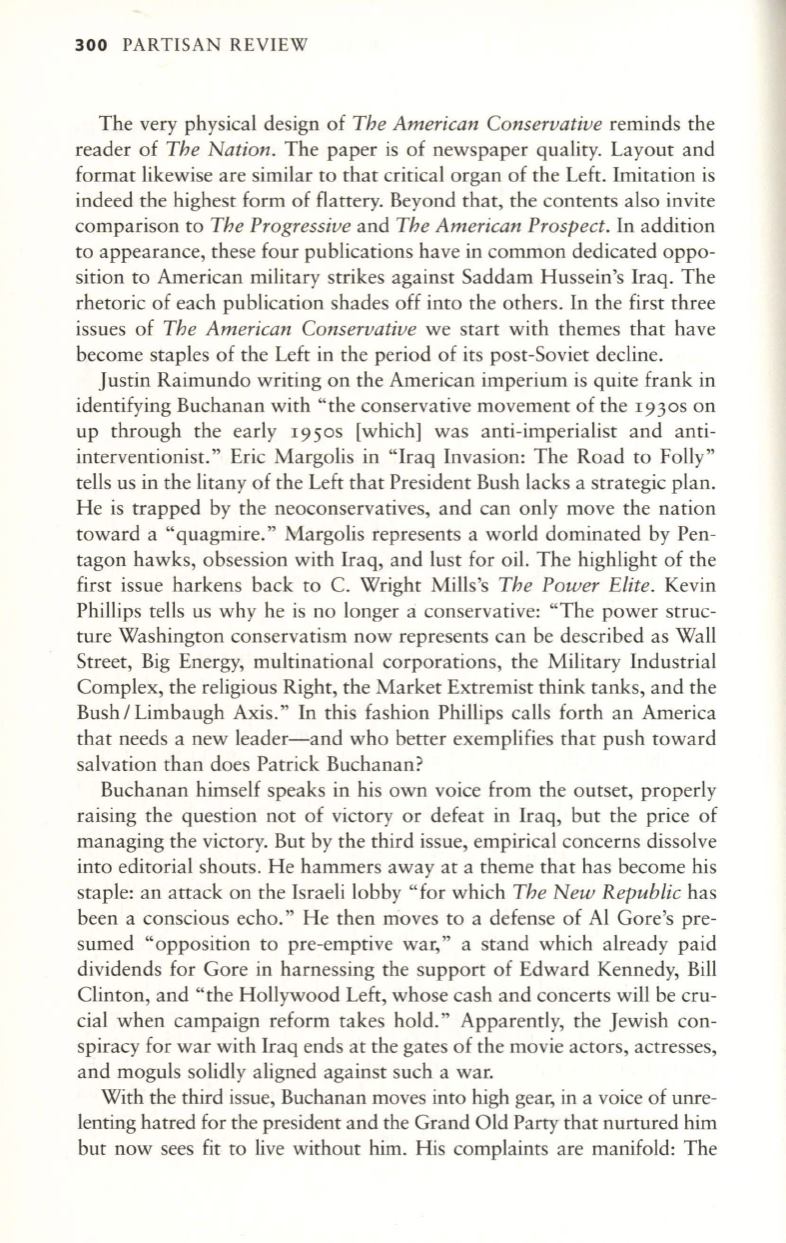
300
PARTISAN REVIEW
The very physical design of
The American Conservative
reminds the
reader of
The Nation.
The paper is of newspaper quality. Layout and
format likewise are similar to that critical organ of the Left. Imitation is
indeed the highest form of flattery. Beyond that, the contents also invite
comparison to
The Progressive
and
The American Prospect.
In addition
to appearance, these four publications have in common dedicated oppo–
sition to American military strikes against Saddam Hussein's Iraq. The
rhetoric of each publication shades off into the others . In the first three
issues of
The American Conservative
we start with themes that have
become staples of the Left in the period of its post-Soviet decline.
Justin Raimundo writing on the American imperium is quite frank in
identifying Buchanan with "the conservative movement of the
1930S
on
up through the early
1950S
[which] was anti-imperialist and anti–
interventionist." Eric Margolis in "Iraq Invasion: The Road to Folly"
tells us in the litany of the Left that President Bush lacks a strategic plan.
He is trapped by the neoconservatives, and can only move the nation
toward a "quagmire." Margolis represents a world dominated by Pen–
tagon hawks, obsession with Iraq, and lust for oil. The highlight of the
first issue harkens back to C. Wright Mills's
The Power Elite.
Kevin
Phillips tells us why he is no longer
a:
conservative: "The power struc–
ture Washington conservatism now represents can be described as Wall
Street, Big Energy, multinational corporations, the Military Industrial
Complex, the religious Right, the Market Extremist think tanks, and the
Bush / Limbaugh Axis." In this fashion Phillips calls forth an America
that needs a new leader-and who better exemplifies that push toward
salvation than does Patrick Buchanan?
Buchanan himself speaks in his own voice from the outset, properly
raising the question not of victory or defeat in Iraq, but the price of
managing the victory. But by the third issue, empirical concerns dissolve
into editorial shouts. He hammers away at a theme that has become his
staple: an attack on the Israeli lobby "for which
The New Republic
has
been a conscious echo." He then moves to a defense of Al Gore's pre–
sumed "opposition to pre-emptive war," a stand which already paid
dividends for Gore in harnessing the support of Edward Kennedy, Bill
Clinton, and "the Hollywood Left, whose cash and concerts will be cru–
cial when campaign reform takes hold." Apparently, the Jewish con–
spiracy for war with Iraq ends at the gates of the movie actors, actresses,
and moguls solidly aligned against such a war.
With the third issue, Buchanan moves into high gear, in a voice of unre–
lenting hatred for the president and the Grand Old Party that nurtured him
but now sees fit to live without him. His complaints are manifold: The


